By Shantanu Kaushik
Over the past decade, we have seen considerable enhancements and upgrades in the IT and infrastructure management fields. The cloud has been the focal point of tremendous evolution cycles that have introduced some concepts that enable and accelerate application development. The base infrastructure retains the concept of a server-user model, but the servers have evolved into a cloud infrastructure that is managed by individual enterprises.
No matter how the IT infrastructure evolves, we will always need the basic or core computing hardware devices somewhere in the mix. Alibaba Cloud Elastic Compute Service (ECS) is an industry-leading service that utilizes the latest high-performing backend hardware, including processors, memory, and storage, to enable the most comprehensive and capable solution.
Alibaba Cloud ECS has made considerable enhancements to its architecture and design. The ECS service is a prime contender in the ever-changing IT industry.
In Part 1 of this series on Alibaba Cloud Elastic Compute Service (ECS), we introduced the concepts of Alibaba Cloud Elastic Compute Service (ECS), its features, benefits, and real-world usage scenarios.
In this article, we will list some of the prominent features of ECS, the related deployment strategy, and the other services integrated with ECS. We will also discuss some of the service interactions that play a prominent role in working with ECS to provide a better set of solutions.
1. Security
The Elastic Compute Service was designed to leverage the security features from the Alibaba Cloud environment. Alibaba Cloud Security Center can be used to secure the ECS instances.
We recommend deploying ECS with a virtual private cloud (VPC). Alibaba Cloud VPC enables a rapid, secure, and controlled network environment. A VPC provides an isolated environment that accounts for integrated security measures and allows for resource access control.
ECS security groups can be used to control inbound and outbound access based on policies. Alibaba Cloud Anti-DDoS Basic is a free solution to mitigate DDoS attacks and secure the applications deployed in ECS instances.
2. Elasticity
Elasticity is in the name. Cloud computing is all about presenting elastic and scalable solutions that can be customized to suit varied business types and work with organizations of any scale.
Alibaba Cloud ECS offers:
Unlike the traditional computing architecture, Alibaba Cloud ECS allows you to configure the service according to your usage. You can configure the instances based on the volume of your transaction and adjust its associated storage capacity.
Alibaba Cloud ECS provides the level of elasticity where you can implement horizontal scaling to redistribute resources between applications when the load increases. This accounts for automatic scale-up and scale-down.
With a combination of vertical and horizontal scaling, Alibaba Cloud ECS provides a supreme elastic scenario for businesses to leverage. This is what Auto Scaling is all about.
Alibaba Cloud provides unlimited storage and helps you automatically provision storage based on the demands. This makes it an elastic storage service.
When setting up Alibaba Cloud ECS, you should configure your Virtual Private Cloud (VPC) to leverage the flexible scalability features it offers. You can work with flexible network configuration, isolate one network from the other, and interconnect data centers with Alibaba Cloud VPC.
3. Availability
Alibaba Cloud provides its services in many zones. If your business is already set up in multiple zones or you are undergoing business expansion, you can leverage the cross-zone functionality of the Elastic Compute Service (ECS). You can achieve better availability by creating ECS instances in more zones.
Alibaba Cloud has a framework of services that are highly-integrated. You can design different architectures based on these services to suit multiple business models, including e-commerce websites or financial service models. You can design services with high-fault tolerance and disaster recovery scenarios.
You can use Snapshots to back up data, maintain high-availability, enhance business continuity, and use multi-zone deployment. You can use deployment sets and Alibaba Cloud Server Load Balancer (SLB) for disaster recovery scenarios.
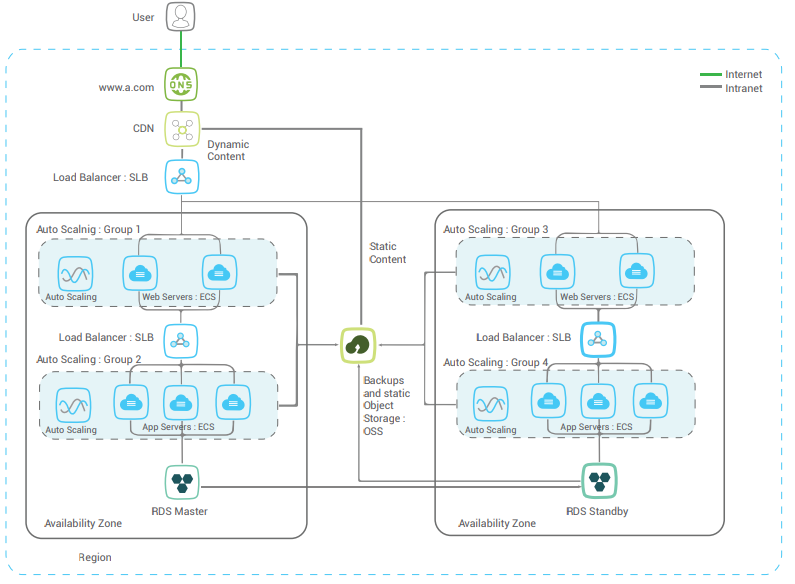
This helps businesses and organizations expand and operate globally without installing resources in every new country or region. The organizations will need a scalable infrastructure that offers high availability and reliability. Alibaba Cloud ECS instances can operate and interlink different regions where data can be synchronized and replicated to provide seamless application usage and experience.
In this scenario, Alibaba Cloud Express Connect seamlessly connects the Virtual Private Clouds (VPCs) to enable a secure connection through the Internet between ECS instances in both regions. Alibaba Cloud Object Storage Service (OSS) enables large volume data replication across zones using the Internet.
This highly efficient system can be used to deploy your applications or services if you need to add multiple application instances across regions with high traffic requirements. Alibaba Cloud offers multiple data transmission solutions to cater to different needs associated with different organizational scenarios.
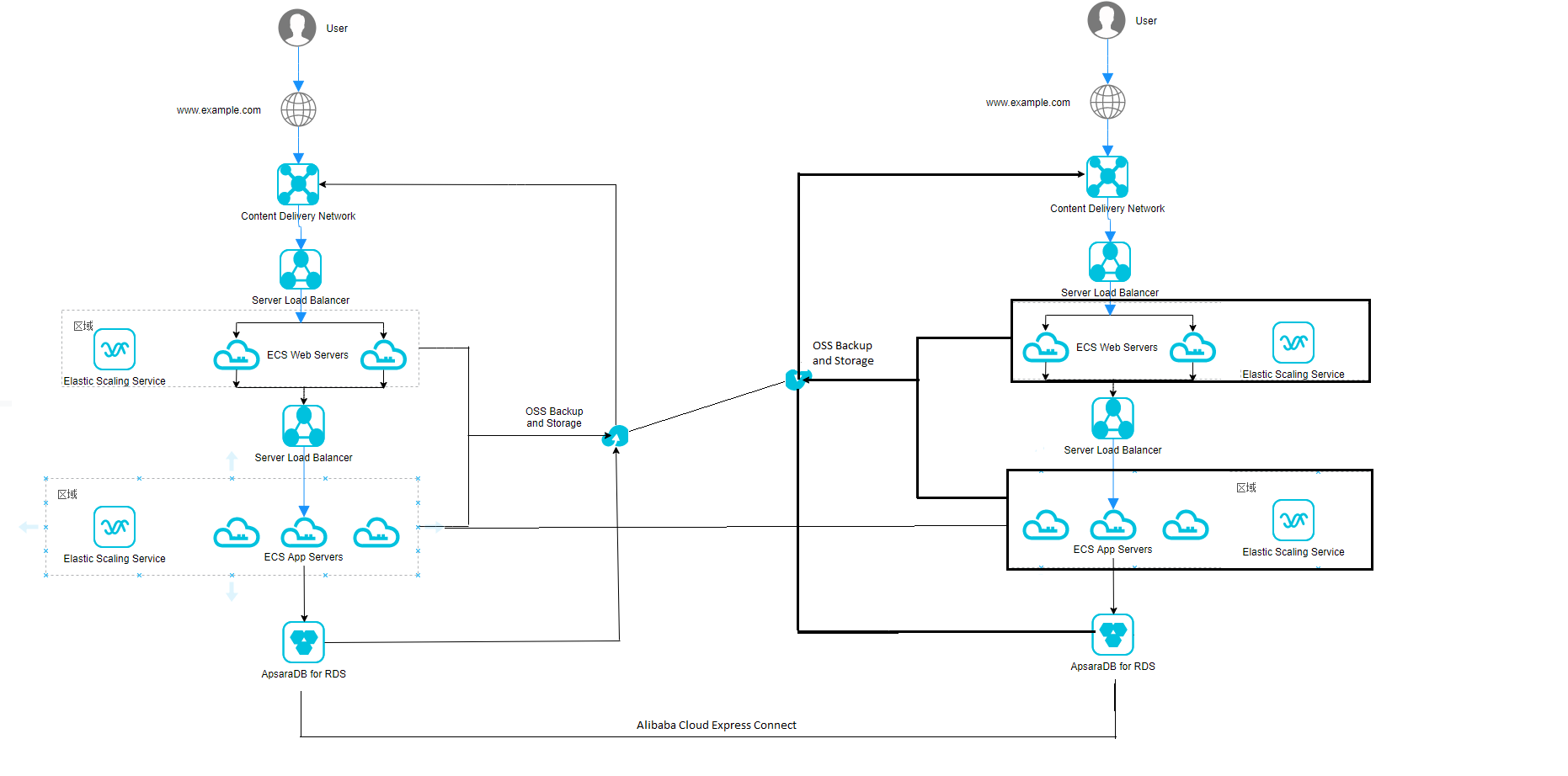
While setting up a new website, you can implement using a low-configuration ECS instance. This ECS instance allows you to run web applications with Apache and NGINX, enables you to host databases, and work with file storage needs by default. When your website’s traffic load increases or when you deploy large-scale applications that require extensive computing power, you can upgrade the ECS instance configurations or add ECS instances on-demand to meet the computing requirements and handle the traffic influx.
Alibaba Cloud ECS is used with Auto Scaling when the number of ECS instances can be adjusted automatically to provide the computing power required to handle the traffic load. Alibaba Cloud ECS implements this scaling scenario to cut down on costs by only provisioning the necessary resources based on the requirements. This helps meet the changing resource requirements at a low-cost. In this scenario, Alibaba Cloud ECS interacts with Server Load Balancer (SLB) to deliver a high availability architecture.
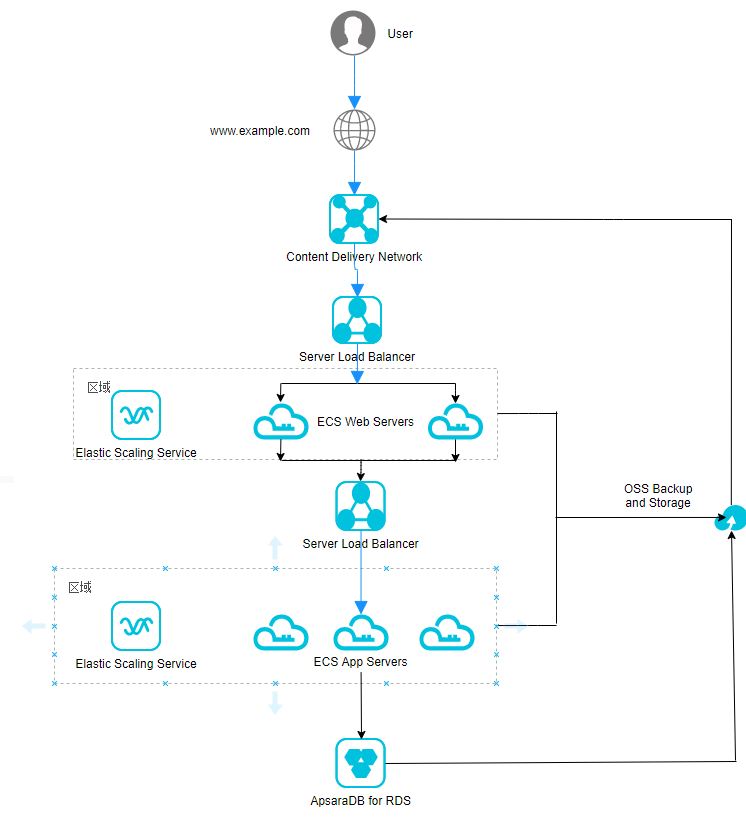
Alibaba Cloud Elastic Compute Service (ECS) extends its massive and flexible computing power for big data analysis with the Hadoop model of distributed computing and large data warehousing systems.
Alibaba Cloud provides an extensive system of data analytics, including big data architecture. Alibaba Cloud DataWorks is a fully-managed big data platform that provides one-stop big data development and processing.
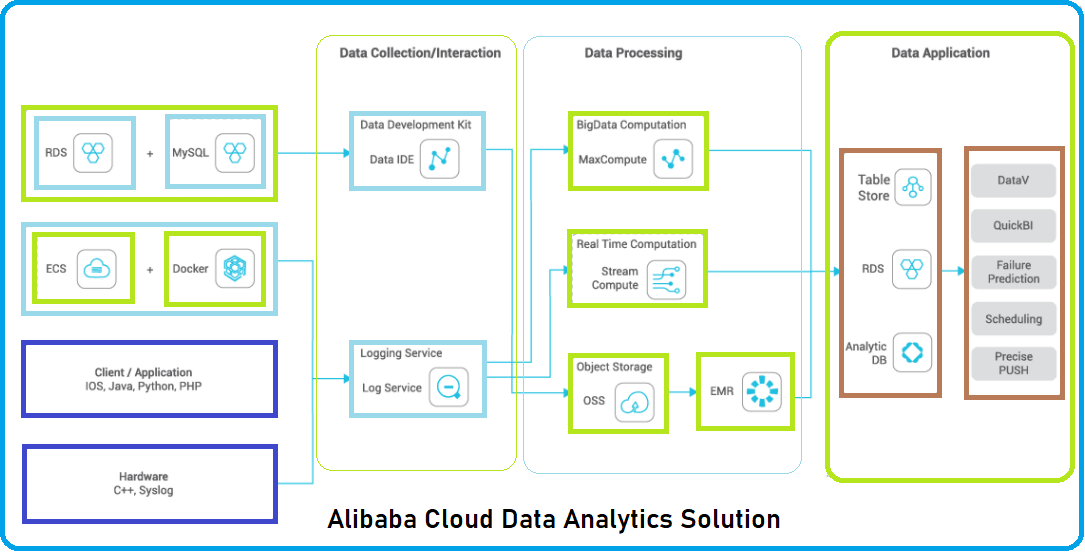
Alibaba Cloud Elastic Compute Service (ECS) offers GPU-accelerated compute-optimized instances. These instances can be used to build AI applications based on industry-leading frameworks. ECS maintains a balance between computing power and graphics processing power to optimize and meet the requirements presented by the customers. As GPU-acceleration is involved, you can work with image processing or video processing, applications with cloud gaming, and augmented/virtual reality application scenarios.
Alibaba Cloud ECS interacts with the Object Storage Service (OSS) to store images, videos, and other content that could hog your bandwidth and processing power during delivery. This scenario also presents the interaction between Alibaba Cloud ECS and Alibaba Cloud Content Delivery Network (CDN). It also interacts with the Server Load Balancer (SLB) to shorten waiting time and reduce bandwidth usage.
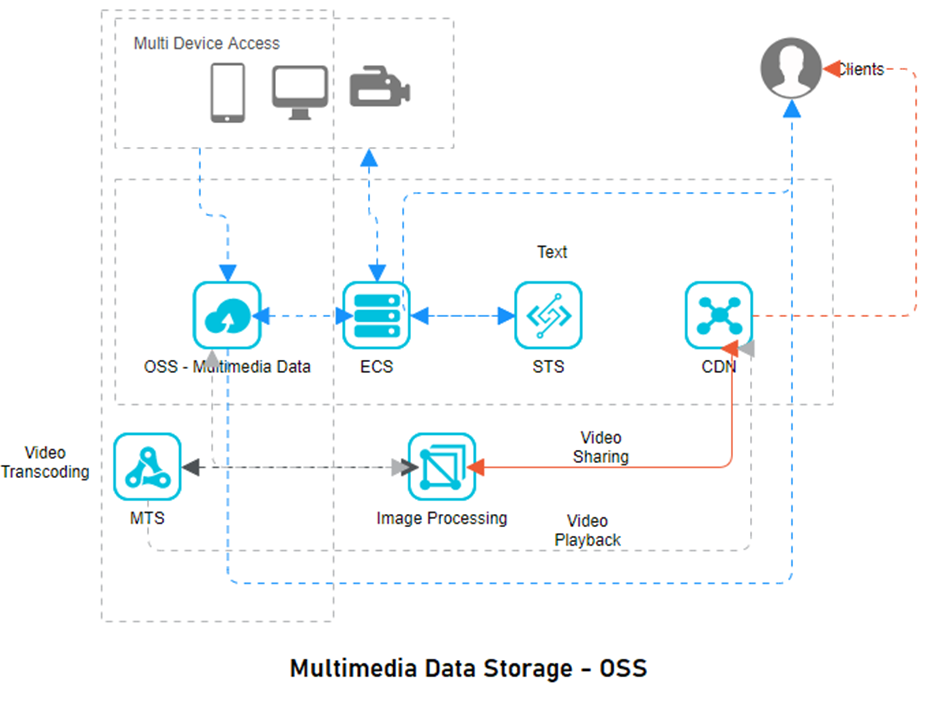
This usage scenario is useful since it improves the overall service availability and showcases how different Alibaba Cloud services can present an efficient, reliable, stable, and available system.
The Elastic Compute Service (ECS) is the basis of computing on the Alibaba Cloud platform. It is provided an IaaS service that has numerous applications. All of these application scenarios cannot be covered in one article, but we listed the prominent ideas to show the capabilities of this dynamic service.
Alibaba Cloud has an elastic computing solution that gives you an edge when deploying in SEA regions along with superb multi-region deployments and disaster recovery redundancies.
Excellence in Deliverance with Elastic Computing: Alibaba Cloud Elastic Compute Service – Part 1
Simplify Workloads with Cloud Resource Management: Resource Orchestration Service

2,593 posts | 791 followers
FollowAlibaba Clouder - February 14, 2021
Alibaba Clouder - February 15, 2021
Alibaba Clouder - January 25, 2021
Alibaba Clouder - November 26, 2020
Alibaba Clouder - January 26, 2021
Alibaba Clouder - January 27, 2021

2,593 posts | 791 followers
Follow Auto Scaling
Auto Scaling
Auto Scaling automatically adjusts computing resources based on your business cycle
Learn More Platform For AI
Platform For AI
A platform that provides enterprise-level data modeling services based on machine learning algorithms to quickly meet your needs for data-driven operations.
Learn More Server Load Balancer
Server Load Balancer
Respond to sudden traffic spikes and minimize response time with Server Load Balancer
Learn More Epidemic Prediction Solution
Epidemic Prediction Solution
This technology can be used to predict the spread of COVID-19 and help decision makers evaluate the impact of various prevention and control measures on the development of the epidemic.
Learn MoreMore Posts by Alibaba Clouder